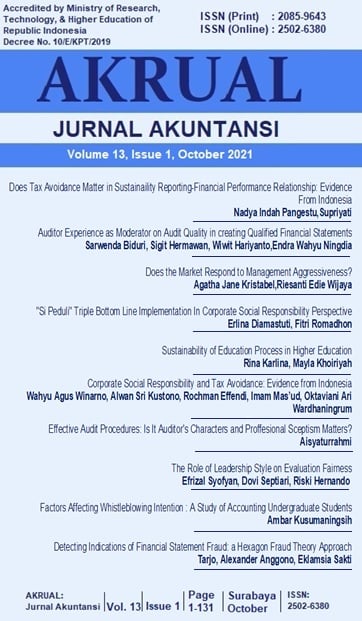Factors Affecting Whistleblowing Intention : A Study of Accounting Undergraduate Students
DOI:
https://doi.org/10.26740/jaj.v13n1.p109-118Abstract
Whistleblowing has gained more attention worldwide. As many as 43% of fraudulent acts can be detected thanks to tips or whistleblowing. Graduates from the Accounting major are future auditors and accountants who are most likely to face illegal actions in their careers. This study aims to understand the factors that motivate undergraduate accounting students’ whistleblowing intention. This study explores how the factors of Consequence’s Magnitude (CM), Social Agreement (SA), Proximity (PX) and Fear of Retaliation (FR) can affect Whistleblowing Intention (WI). The results of this study indicate that the CM, SA, and PX factors have no significant effect on WI, while the FR factor has a significant effect on WI. This research is expected to positively contribute to assisting Lecturers of the Accounting Department in designing a curriculum to encourage undergraduate Accounting students to have stronger WI and be ready to be practised in the actual working environment. This research is also useful for future researcher who would like to explore the topic of whistleblowing intention.
References
Apadore, K., Chin, C., Qi, M., Yan, T., Waynnie, G., & Min, W. (2018). Factors Affecting Whistleblowing Intention: An Empirical Study. South East Asia Journal of Contemporary Business, Economics and Law, 108-118.
Association of Fraud Examiners. (2020). Report To The Nations 2020 Global Study on Occupational Fraud and Abuse.
ACFE.Chen, C. P., &Lai, C. T. (2014). To blow or not to blow the whistle: The effects of potential harm, social pressure and organisational commitment on whistleblowing intention and behaviour. Business Ethics: An European Review, 327-342.
Damayanthi, K. S., Sujana, E., & Herawati, N. T. (2017). Pengaruh Norma Subyektif, Sikap Pada Perilaku, Persepsi Kontrol Perilaku Terhadap Niat Melakukan Pengungkapan Kecurangan (Whistleblowing) (Studi Empiris Pada Mahasiswa Akuntansi Program S1 dan Program D3 Universitas Pendidikan Ganesha). Jurnal Ilmiah Mahasiswa Akuntansi Undiksha.
Fatoki, O. (2013). Internal Whistleblowing Intentions of Accounting Students in South Africa: The Impact of Fear of Retaliation, Materiality and Gender. Journal of Social Sciences, 31-44.
Finandari, D., & Wijayanto, T. (2016). Analisis Pengaruh Dimensi Budaya Terhadap Niat Melakukan Whistleblowing (Perbandingan Antara Mahasiswa Dan Engineer). Jurnal TeknoSains, 1-58.
Heumann, M., Friedes, A., Cassak, L., Wright, W., & Joshi, E. (2013). The World of Whistleblowing. Public Integrity, 25-52.
Kennett, D., Downs, A., & Durler, M. G. (2011). Accounting students' intent to blow the whistle on corporatefraudulent financial reporting: An experiment. International Journal of Business and Social Science, 14-23.
Lasmini, N. N., & Ramantha, I. W. (2019). Persepsi Mahasiswa Akuntansi Pada Perilaku Whistleblowing. E-Jurnal Ekonomi dan Bisnis Universitas Udayana , 1209-1236.
Lincoln, S. H., & Holmes, E. K. (2011). Ethical decision making: a process influenced by moral intensity. Journal of Healthcare, Science and the Humanities, 55-69.
Mencl, J., & May, D. R. (2009). The effects of proximity and empathy on ethical decision-making: An exploratory investigation. Journal of Business Ethics, 201-226.
Setyawati, I., Ardiyani, K., & Sutrisno, C. R. (2015). The Factors Influencing Internal Whistleblowing Intentions. Jurnal Ekonomi & Bisnis, 22-33.
Shawver, T. J. (2011). The effects of moral intensity on whistleblowing behaviors of accounting professionals. Journal of Forensic & Investigative Accounting, 162-190.
Shawver, T. J., & Clements, L. H. (2014). Are There Gender Differences When Professional Accountants Evaluate Moral Intensity for Earnings Management? Journal of Business Ethics, 557-566.
Sweeney, B., & Costello, F. (2009). Moral intensity and ethical decision-making: An empirical examination of undergraduate accounting and business students. Accounting Education: An International Journal, 75-97.
Wahyu, S., & Mahmudah, H. (2018). Pengaruh Komitmen Profesi, Sosialisasi Antisipatif Mahasiswa Akuntansi Dan Ethical Climate Principle Terhadap Niat Whistleblowing. Jurnal Ilmiah Ekonomi dan Bisnis , 165 -176.
Downloads
Published
How to Cite
Issue
Section
License
Copyright (c) 2021 Ambar Kusumaningsih

This work is licensed under a Creative Commons Attribution-NonCommercial 4.0 International License.
 Abstract views: 717
,
Abstract views: 717
, PDF Downloads: 681
PDF Downloads: 681


















